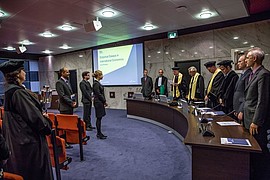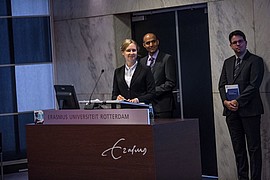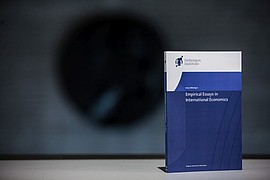PhD Defence: Irena Mikolajun

In her dissertation ‘Empirical Essays in International Economics’ Tinbergen’s Irena Mikolajun uses recent econometric techniques to empirically assess key aspects surrounding events in the international arena, such as the recession, the Arab spring, and the Maidan Revolution.
Irena defended her dissertation in the Senate Hall at Erasmus University Rotterdam on Thursday, 27 October 2016 at 15:30. Her supervisor was Prof. Jean-Marie Viaene and her co-supervisor was Prof. Richard Paap. Other members of the Doctoral Committee were Prof. Giovanni Facchini (University of Nottingham), Prof. Franc Klaassen (Universiteit van Amsterdam), Prof. Casper de Vries (Erasmus School of Economics), Dr Steven Poelhekke (Vrije Universiteit Amsterdam, De Nederlandsche Bank), and Dr Vadym Volosovych (Erasmus School of Economics)
About Irena Mikolajun

Irena Mikolajun received a Cum Laude MSc degree (2008) and a BSc degree (2006) in Statistics and Econometrics from Vilnius University, Lithuania. During her graduate studies she spent 1.5 years in Padua University, Italy with an Italian government and an Erasmus exchange grant. Her PhD project deals with the application of modern econometric techniques to analyze questions relevant in the field of international economics. Besides academic work, Irena gained consulting and policy experience working at the European Central Bank (2014/2015), Euromonitor International (2006/2008) and Bank of Lithuania (2006). She acquired parts of her education in 4 different languages (English, Italian, Lithuanian and Russian).
Thesis Abstract

The recent decade was rich of events in the international arena. The world has experienced the deepest recession since the World War II. The sluggish recovery that followed and the prolonged phase of low inflation posed challenges to governments and central banks of many world economies. The end of 2010 brought the Arab Spring to the Middle East and North Africa. The turmoil had significant geopolitical and economic consequences for the region. It strongly hit the region's tourism sector, decreased workers' remittances and created uncertainty among domestic and foreign investors. Four years later the Maidan Revolution took place in Ukraine which prompted the signing of the so called Deep and Comprehensive Free Trade Area agreement between the country and the European Union. The trade agreement came into force on January 1st, 2016. Using recent econometric techniques this thesis empirically assesses key aspects surrounding these events.
Photos: Chris Gorzeman / Capital Images


